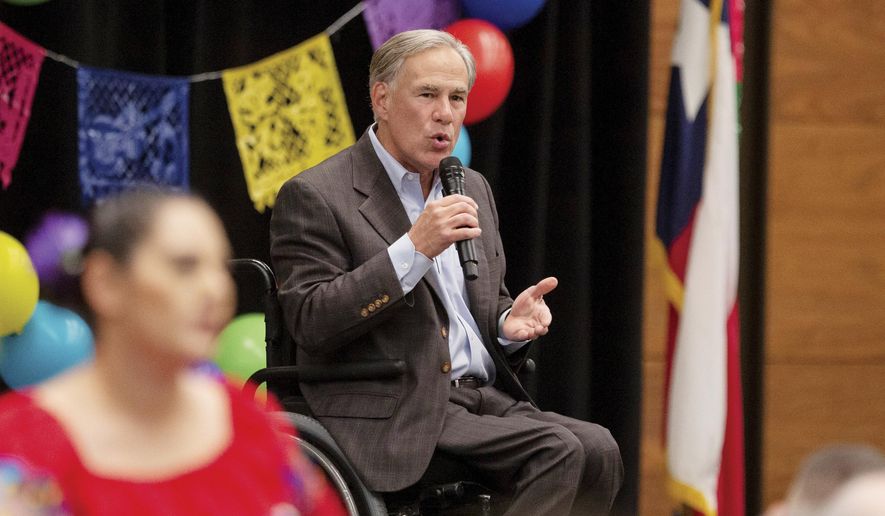The Republican National Committee is trying to forge inroads with Black, Hispanic and Asian Americans through a network of community centers across the country.
The party has opened 20 centers in several swing states and plans to open more in the run-up to the midterm elections in November.
A center that opened in Houston this week caters to a Hispanic neighborhood. Like the other community centers, it offers a variety of events and services and gives insight into Republican Party beliefs.
“At the end of the day, we know that Hispanics belong in the Republican Party,” said Macarena Martinez, the RNC’s Texas communications director. “We’re grounded within the same ideology of safety, freedom and economic opportunity.”
The community centers host movie nights, parties, prayer vigils, and toy and food drives during the holiday season.
For Black History Month in February, the community center in the Atlanta suburb of College Park will hold a “coffee and conversations” session every Friday. Participants will have free breakfast and coffee and will engage in discussions about the Republican Party and conservative beliefs.
The RNC’s multimillion-dollar investment in community centers aims to build on the party’s recent gains with voting blocs that traditionally back Democrats.
Despite losing the election in 2020, President Trump increased support from Hispanic voters and Black voters. Newly minted Virginia Gov. Glenn Youngkin grabbed support from Hispanics last year with messages on education and economics.
A Democratic National Committee aide dismissed the community centers as more optics than an earnest attempt to connect with a diverse set of voters.
“These community centers are window dressing and just flashy things that they’re doing to get a couple of headlines without putting in the resources, money and investment to actually target these voters,” the aide said. “There’s a litany of issues where Republicans are on the opposite of these communities they’re trying to make inroads in.”
The DNC isn’t ignoring Republican gains with minority voters even though people of color overwhelmingly support Democrats. The DNC plans to spend $20 million on an effort to shore up support among Black and Hispanic voters this year.
For the Republican Party, courting Black and Hispanic voters is a matter of survival, said Costas Panagopoulos, a political science professor at Northeastern University.
“Given the changing demographics in the country, [they must] target voters who are people of color and underrepresented minorities who may have not historically affiliated with the Republican Party,” he said. “The GOP has no choice but to make inroads with those voters to remain viable in elections.”
The centers are typically located in strip malls alongside local and minority-owned businesses.
“We just look to where there is going to be the most impactful place. For the most part, it happens to be where the Black-owned businesses are, where the [Asian Pacific American] businesses are, and where the Hispanic-owned businesses are,” said Savannah Viar, the RNC’s southeast regional communications director.
The RNC has community centers in Black neighborhoods in Cleveland and in College Park, Georgia.
Some of the Hispanic neighborhoods that the community centers serve are in Miami and Milwaukee and in the Texas cities of Houston, Laredo, McAllen and San Antonio.
Centers in Asian American communities have opened in Dallas, Orange County, California, and Gwinnett County, Georgia. Dallas is also home to a center catering to Indian Americans.
A center in a Native American community is scheduled to open in Robeson County, North Carolina.
The RNC is promoting the venues through local media coverage, social media and traditional get-out-the-vote efforts such as knocking on doors. Ms. Viar said the party hires staff from within the communities, which also helps spread the word about the centers.
Garrison Douglas, the RNC’s Georgia communications director, said the initiative is different from traditional campaign efforts of hiring a minority outreach director or reaching voters from the top down.
Mr. Douglas, who worked at a community center in Mableton, Georgia, in 2020, said another goal is to engage people with others from their communities, not just with political staffers.
“This is something that really is a historic thing for any sort of political party to really be involved with,” Mr. Douglas said. “These are dedicated community centers specified to interact with the community and bring in folks and engage folks within that community.”
Former Georgia state Rep. Melvin Everson, the first Black Republican to be elected to the state legislature since Reconstruction, said the community centers show voters that the Republican Party is present in their neighborhoods.
“When you go out and you share a message about economic empowerment, safe communities, great quality schools — that resonates with people overall. We have to take that message,” said Mr. Everson, who serves as an RNC volunteer. “We won’t reach and convince everyone, but we will reach and convince quite a few of them. There have been many times we have not gone into these communities, and that’s what we’re attempting to do now.”
• Mica Soellner can be reached at msoellner@washingtontimes.com.




Please read our comment policy before commenting.